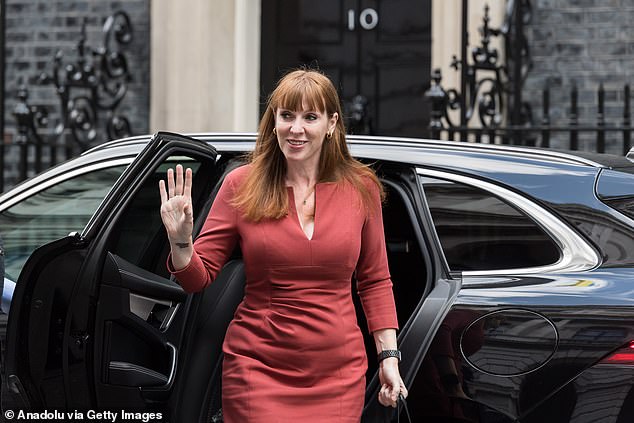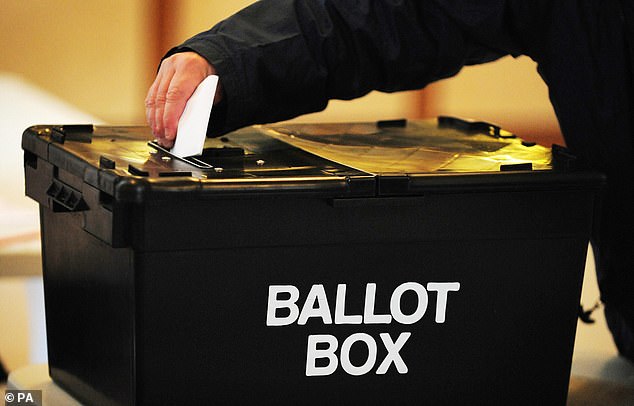Labour is to push ahead with plans to lower the minimum voting age to 16 at the next general election – despite almost half of teens themselves saying it is a bad idea.
Ministers today unveils plans they said would ‘modernise our democracy’ by widening the franchise to bring national elections in line with those held in Scotland and Wales.
But the move, a manifesto pledge from the party, has been criticised as a cynical ploy since a large proportion of young voters support Labour.
In a blow to the party, however, it has emerged that almost half of teenagers do not even want to be given the vote.
In a poll, some 49 per cent of those questioned said they disagreed with the move. Only a few more of the 500 youths questioned by Merlin Strategy, 51 per cent, backed Labour’s proposal.
In addition, only 18 per cent of the 16 and 17-year-olds polled said they would definitely cast a ballot if there was an election tomorrow – with 13 per cent saying they would not take part.
But of those who would vote, 33 per cent would back Labour, the highest support for any party.
A Tory source said: ‘This is bare-faced ballot box stuffing. It’s a sign of desperation this failing Labour government is resorting to underhand tactics and rigging extra votes to try and cling on to power for longer.’
Ministers are also proposing to introduce automated voter registration, which is already used in Australia and Canada, and making UK-issued bank cards an accepted form of ID at polling stations.

Ministers today unveils plans they said would ‘modernise our democracy’ by widening the franchise to bring national elections in line with those held in Scotland and Wales.

But the move, a manifesto pledge from the party, has been criticised as a cynical ploy since a large proportion of young voters support Labour.
The Ministry of Housing, Communities and Local Government said ‘far too many people’ had been put off voting by the voter ID rules introduced by the previous government, with the Electoral Commission finding around 750,000 people did not vote due to a lack of ID.
The Government has already made the Veteran Card an accepted form of voter ID, and intends to allow digital forms of ID to be used when they become available.
Deputy Prime Minister Angela Rayner said: ‘For too long public trust in our democracy has been damaged and faith in our institutions has been allowed to decline.
‘We are taking action to break down barriers to participation that will ensure more people have the opportunity to engage in UK democracy, supporting our plan for change, and delivering on our manifesto commitment to give 16-year-olds the right to vote.’
Currently only those who are over 18 can take part in general elections, although 16 and 17-year-olds are allowed to vote for the devolved Scottish and Welsh parliaments.
It is estimated another 1.5 million teenagers will be enfranchised for the next election – though Labour has dropped controversial plans to give millions of EU nationals the vote.
A survey of young people – commissioned by ITV News – found 33 per cent of teenagers would vote Labour. And while 20 per cent said they would choose Reform, only 10 per cent would vote Conservative.
Thursday’s plans will also see a tightening of the rules on campaign finance aimed at barring ‘shell companies’ from donating to political parties and requiring more checks on donations to unincorporated associations.
The Electoral Commission will be given the power to levy £500,000 fines on those who break the new rules on donations.
The proposal follows concern about the vulnerability of UK politics to donations from overseas, which came to prominence amid reports Elon Musk was considering a major donation to Reform UK.
Unincorporated associations have long been another concern of transparency campaigners, who have warned they can obscure the real source of political donations.
It also comes as the Electoral Commission reported spending at last year’s general election hit a record high of £94.5 million, including £69.3 million spent by political parties.
Labour outspent its rivals, shelling out £30 million during the campaign, more than twice the amount it spent in 2019, while the Conservatives spent £23.9 million and the Liberal Democrats £5.6 million.
Reform spent £5.5 million, the Greens £1.7 million and the SNP £799,000.
Thursday’s plan will see the Government bring forward legislation to introduce its new rules, which also include tougher sentences for people who intimidate candidates amid a rise in reports of abuse aimed at those standing for election.
Harry Quilter-Pinner, executive director of the IPPR think tank, said the changes were ‘the biggest reform to our electoral system since 1969’, when the voting age was lowered to 18.
He said: ‘Barely half of people voted in last year’s general election.
‘Our democracy is in crisis, and we risk reaching a tipping point where politics loses its legitimacy.
‘The Government has clearly heard these alarm bells.’
Arguing that lowering the voting age and introducing automated voter registration could bring 9.5 million more people into the democratic process, he said: ‘At a time when public trust in politics is at a low ebb, this expansion of our democracy is a vital step toward rebuilding confidence, modernising our institutions and pushing back against the rise of populism.’











